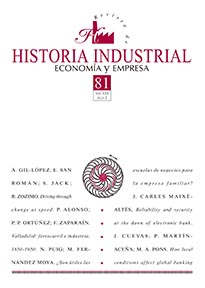¿Son útiles las escuelas de negocios? Una aproximación desde las empresas familiares españolas
DOI:
https://doi.org/10.1344/rhi.v30i81.31568Paraules clau:
escuelas de negocio, empresa familiar, España, siglo XX, cambio organizacionalResum
Este articulo se ocupa del impacto de las escuelas de negocios en la organizacion y el crecimiento de las empresas de su entorno. Aunque se trata de una cuestion crucial para comprender el poder adquirido por esta institucion en la economia global, apenas ha sido abordada desde la historia economica. Nuestra investigacion se centra en la relacion forjada entre el Instituto de Estudios Superiores de la Empresa (IESE) y tres grupos familiares, Salvat, Puig y Lladro, a traves de sus profesores-consultores y alumnos-propietarios-directivos desde la fundacion de la escuela en 1958 hasta finales del siglo xx. El analisis permite, en primer lugar, identificar las fuerzas exogenas y endogenas que participaron en la creacion de IESE, una de las escuelas mas competitivas del mundo en el siglo xxi. En segundo lugar, se comprueba que los primeros programas de formacion de directivos (executive education) del instituto proporcionaron conocimiento especializado, servicios de consultoria y una red de contactos que amplificaron la influencia de IESE en el desarrollo a largo plazo de las empresas vinculadas a sus alumnos. Y en tercer lugar, se explica la participacion activa de la escuela y algunas de las empresas de su entorno en el proceso de legitimacion academica de los estudios de la empresa familiar que tuvo lugar en todo el mundo a partir de los anos ochenta del siglo xx.
Descàrregues
Descàrregues
Publicades
Com citar
Número
Secció
Llicència
The author assigns all rights to the publisher. Creative Commons
The author who publishes in this journal agrees to the following terms:
- The author assigns all intellectual property rights exclusively to the publisher for the entire duration of the applicable intellectual property rights.
- The publisher will distribute the texts under the Creative Commons Attribution License, which allows others to share the work, provided that they acknowledge the authorship, its initial publication in this journal, and the conditions of the license.





